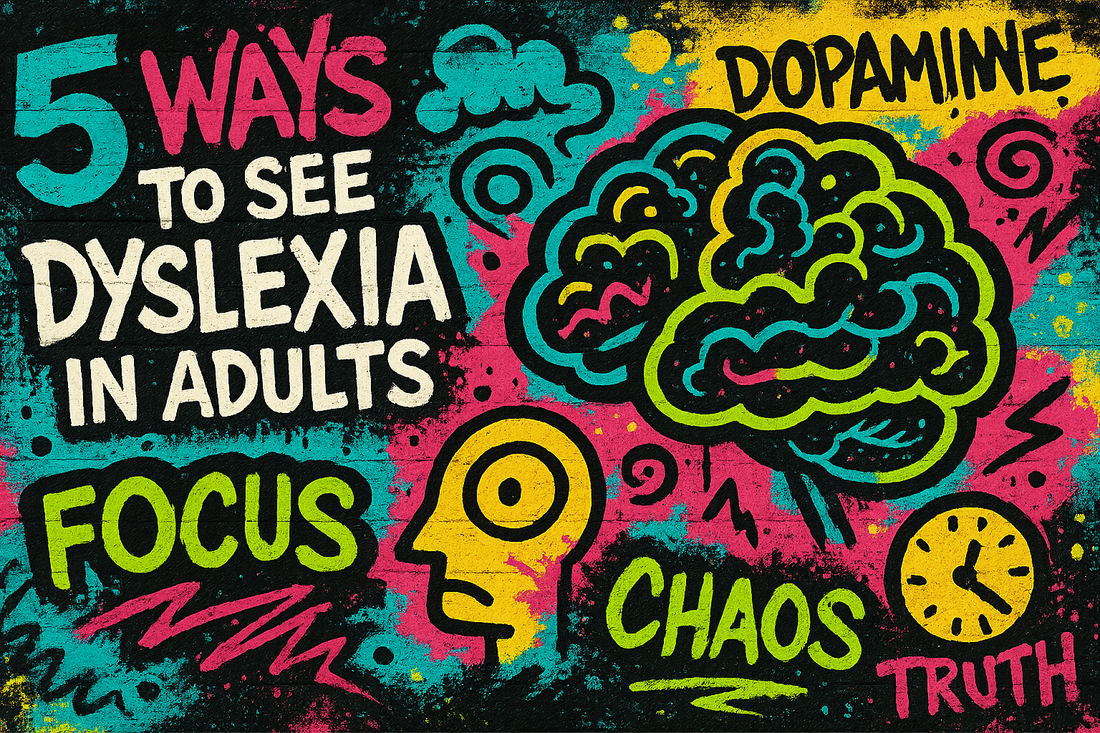
5 Ways To See Dyslexia In Adults
Share
Ever found yourself wondering if you might be dyslexic, even though you’re already grown up? You’re not alone. This episode highlights five signs that might surprise you, proving dyslexia isn’t just a childhood issue but something that can shape adult life too.
Stephen Martin talks about everything from storytelling to emotional object permanence. If you recognise yourself in any of these traits, it could be a nudge toward exploring your own neurodivergent mind. Below is a brief overview of what was discussed.
What Dyslexia Might Look Like
Many of us think dyslexia is only about reading and writing. In reality, it can show up in more subtle ways. One interesting trait is a love of telling stories. Dyslexic thinkers can paint pictures with words, offering friends or colleagues lively accounts of their day. This flair for narrative often goes unnoticed as a dyslexia marker in adulthood.
The podcast also points out difficulty processing words when there’s lots of noise. Crowded cafes or busy offices can make focusing on a conversation feel like running through treacle. It’s an invisible challenge, so others might mistake it for daydreaming or disinterest.
“The power of storytelling is massive. Dyslexic minds often come alive when sharing experiences from their own lives.”
Navigating Emotional Challenges
One big theme of this episode is something called emotional object permanence. Sometimes dyslexic adults forget how they felt about someone or something once that person or event isn’t in front of them. It can lead to drifting relationships or confusion, because others might expect you to hold certain emotions longer.
Another challenge is spotting cause and effect. A dyslexic brain can focus on problems in the present while missing how they formed in the first place. This can lead to feeling stuck, repeating old patterns, or not seeing what set off the issue in the first place. Identifying this blind spot is the first step to making changes.
Dealing with Interruptions
Ever get instantly frustrated when someone cuts you off in conversation? That feeling could be tied to dyslexia. It’s not just being annoyed at bad manners, it’s how a dyslexic mind can be daydreaming several thoughts at once. An interruption can derail that mental flow, leaving you flustered or forgetful about what came next.
When you’re trying to juggle words, sounds, and even anxieties about saying the right thing, it’s easy to snap. Recognising this sign helps you respond more calmly, especially if it’s a close friend or colleague. They might just be excited, not out to poke holes in your ideas.
Neurodiversity and Acceptance
This episode reminds us that dyslexia isn’t an isolated condition. It’s often part of a broader neurodiverse profile that can include ADHD or autism. A lot of adults only discover they’re dyslexic after they’ve learned more about neurodivergence in general. Realising you’re part of this wider spectrum can make you feel less alone.
When you name these traits, you can start working with them instead of getting stuck. Maybe you ask for a quieter workspace, or you schedule extra time to process big ideas. Recognising your strengths and weaknesses is the key to personal growth.
Beyond Labels
We don’t want to be defined by a single label. Dyslexia is just one part of who we are. Understanding how we tick unlocks the ability to thrive in everyday life. Some folks use their natural storytelling talent to become authors or public speakers. Others find fresh ways to stay calm in chaotic environments.
Being open to new approaches can transform how you see yourself. You might be a whizz at putting ideas together creatively or empathising with others who face challenges. The more you learn about your own brain, the greater your ability to connect with people who appreciate your unique viewpoint.
- Many adults discover they’re dyslexic later in life.
- Storytelling can be a powerful way dyslexic thinkers communicate.
- Processing words in noisy environments is a common struggle.
- Emotional object permanence plays a big role in relationships.
- Cause and effect isn’t always straightforward in the dyslexic mind.
- Quick frustration when interrupted can be a subtle sign of dyslexia.
- Neurodiversity includes ADHD, autism, and more.
- Recognising dyslexic traits leads to better self-support.
- Understanding your brain fosters personal growth.
- Many people with dyslexia don’t realise it until adulthood.
Curious to hear the full conversation and learn more? The podcast player is above, ready when you are. Give it a listen and see if any of these traits resonate. You might just discover a new way of seeing yourself.
Join the club at rightbrainresetters.com for further insights. And if you’d like a boost, get 20% off your first order at https://addednutrition.com. Finally, head over to truthaboutdyslexia.com or our Facebook Group for support and community.

